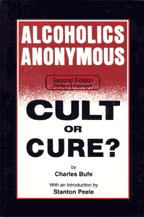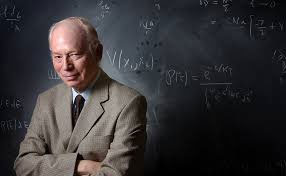 Recently Rick Ross, one of America’s leading expert on cults and author of Cults Inside Out, who has long performed a major public service via his sites cultnews.net and cultnews.com (probably the best online sources of news and information on cults), addressed the question of whether Donald Trump and his followers constitute a cult. Ross’s conclusion is that no, Trump and his movement do not constitute a cult.
Recently Rick Ross, one of America’s leading expert on cults and author of Cults Inside Out, who has long performed a major public service via his sites cultnews.net and cultnews.com (probably the best online sources of news and information on cults), addressed the question of whether Donald Trump and his followers constitute a cult. Ross’s conclusion is that no, Trump and his movement do not constitute a cult.
While I share that conclusion, I believe that some of Ross’s specific reasons for reaching it are debatable. For example, “Trump is not an absolute authoritarian ‘cult’ leader like a Jim Jones, Charles Manson or David Koresh. He was democratically elected and is subject to congressional oversight, judicial review by the courts and must run to be reelected. The President of the United States is also constitutionally limited by law to no more than two terms (eight years) as president.” This ignores that Trump wants to be an absolute ruler and is doing everything in his power to destroy the constitutional and institutional limits on his power, and encourages his followers to support him in doing this.
Rather than go over the other points I consider debatable, I’d encourage those who have the time to read Ross’s article before reading the following, which is a lightly edited and slightly expanded version of a post I published last year.
* * *
 by Chaz Bufe, author of Alcoholics Anonymous: Cult or Cure?
by Chaz Bufe, author of Alcoholics Anonymous: Cult or Cure?
Of late, critics often accuse Donald Trump and his followers of being a cult. The problem is that they seemingly never define what a cult is, never define the characteristics of a cult, and of course never see how well Trump & co. match such characteristics. It’s time to do so.
Before I began writing AA: Cult or Cure?, I spent well over a year on research, much of it involving religious and political cults. I discovered that all cults, whatever their nature — religious, political, commercial (e.g., multi-level marketing scams) — have many characteristics in common. By the end of my research, I had discovered 23 separate characteristics common in cults; some cults exhibit almost all of them.
(Robert Jay Lifton in his groundbreaking and influential Thought Reform and the Psychology of Totalism lists eight cult-like characteristics; while I included Lifton’s characteristics in the list I compiled, I strongly believe that his book would have been better if he had included more such characteristics — ones I believe are obvious. The same goes for Rick Ross’s discussion of the cultlike aspects of the Trump movement.)
Let’s see how many of the 23 cult characteristics Trump and his followers exhibit:
1) Religious orientation. Are Trump and his followers religiously based? Yes.
Trump’s core followers are conservative evangelicals. He received the votes of 81% of them in the 2016 election, and that level of support remains virtually unchanged. As well, Trump — who’s about as religious, and has about as much knowledge of the Bible, as the average poodle — routinely panders to evangelicals, flattering them endlessly and doing his best to ram through anti-choice, anti-LGBT judges and repressive, religiously inspired laws. Of late, Trump and his followers have even taken to describing him in purely religious, messianic language, as “the chosen one.”
2) Irrationality. Are Trump and his followers irrational, do they discourage skepticism and rational thinking? Emphatically yes.
Trump and his followers are characterized by their ignorance of and contempt for science and rationality. The examples of this are manifold, with climate-change denial being the most obvious and dangerous. Climate scientists — who arrived at their conclusions through massive, decades-long research and application of the scientific method to the data they’ve gathered — are virtually unanimous in the conclusions that climate change is due to human activity (especially the burning of fossil fuels) and that it’s a dire threat to humanity. Trump and his followers irrationally and dangerously deny this.
3) Dogmatism. Are Trump and his followers dogmatic? Yes in the case of Trump’s followers, no as regards Trump himself.
Trump’s most fervent followers, evangelicals, Bible literalists, are by definition dogmatists. They believe (or at least insist that they believe) that a 3,000-year-old book written by Iron Age slaveholders is inerrant, true in every respect. This leads them to insist on absurdities, such as that the Earth is only 6,000 years old; that humans and dinosaurs lived at the same time (or that the devil placed fossils in the earth to mislead humans); that, for that matter, the devil actually exists; that the sun stood still; that a dead man arose after three days and walked out of his tomb . . . The list of dogmatic absurdities goes on and on. In contrast, Trump himself is an amoral opportunist with no apparent beliefs who will say and do anything as long as he thinks it’s in his self-interest to do so.
4) “Chosen People” mentality. Do Trump and his followers have such a mentality? Yes.
Trump’s evangelical supporters routinely and self-flatteringly refer to themselves using terms such as “God’s people,” “the elect,” and “the righteous.” They also consider themselves above other people, especially atheists and muslims, with a great many evangelicals (and other conservative religious folk) saying they would never vote for an atheist or muslim for public office. Trump himself is a very privileged rich kid with a massive sense of entitlement. He was a schoolyard bully as a child; he believes he has the right to grope women — and has bragged about that groping; and seems to abuse almost everyone unfortunate enough to come in contact with him. Only someone who thinks he’s better than other people, who thinks he’s entitled to do such odious things, would do them. One might also mention “American exceptionalism” here, a belief apparently held by almost all of Trump’s followers and, perhaps, by Trump himself.
5) Ideology above all else. Do Trump and his followers elevate their ideology over experience, observation, and logic? Yes, absolutely.
Again, the most obvious example is climate-change denial. But other examples abound, such as the insistence that grossly ineffective abstinence-only sex “education” is the only type that should be taught in public schools; that a few cells the size of a pinhead are, somehow, a “person” (apparently in the same manner that an acorn is an oak tree); that massive tax cuts for the top 1% are somehow good for the bottom 99%; and that America is the land of “equal opportunity” in the face of gross inequality in wealth and income and equally gross inequality in the quality of education for the rich and poor.
6) Separatism. Are Trump and his followers separatists? No.
We might be better off if they were. Instead of being separatists, they want to impose their beliefs on the rest of us through the coercive apparatus of the state.
7) Exclusivity. Do Trump and his followers present themselves as the exclusive holders of the truth. Yes.
Trump has been quite explicit about this. At a VFW convention on July 24, 2018, Trump said, “Just remember, what you are seeing and what you are reading is not what’s happening. Just stick with us . . .” As well, Trump’s core evangelical followers, biblical literalists, by definition consider themselves the exclusive holders of the (religious) truth. (The same holds for his Mormon and conservative Catholic backers.)
8) Special knowledge. Do Trump and his followers claim to have special knowledge that will only be revealed to the initiated? No.
Not unless you count Trump’s for-profit “university” scam, and that would be a stretch.
9) Mind control. Do Trump and his followers employ mind-control techniques? No.
Even Trump’s most hardcore followers don’t employ mind-control techniques such as sleep deprivation, deliberate near-starvation, hypnotic chanting, and thought-stopping techniques (e.g., reciting a mantra over and over again to ward off unwanted thoughts).
10) Thought-stopping techniques. Do Trump and his followers employ thought-stopping language? Not really.
The childhood indoctrination of Trump’s religious-believer backers (evangelicals, conservative Catholics, Mormons), in which children are routinely warned that doubt comes from the devil (and, from my childhood, that you should pray the rosary to ward off doubt), is as close as you’ll get to thought-stopping language in the Trump movement.
11) Manipulation through guilt. Does Trump manipulate his followers through guilt? No.
Rather, Trump manipulates his followers through fear, hate, bigotry, and scapegoating. His appalling attacks on Mexicans and his fear-mongering about an “invasion” of immigrants is only the most obvious example.
12) The cult of confession. Do Trump and his followers use confession for purification and to tie believers to the movement? No.
The closest any of Trump’s followers come to this is the practice of conservative Catholics who use that “sacrament” for purification and to tie themselves to the church.

13) A charismatic leader. Is Trump a charismatic leader, and do his followers treat him as one? Clearly, yes.
I’d use many other terms in place of “charismatic,” but the adoration of the Dear Leader by his glassy-eyed followers is all too obvious. The fact that by their own lights he’s moral garbage matters not a whit to them. Nor do his constant, obvious lies and boasting, frequent self-contradiction, bullying behavior, and shameful self-serving. All too many of Trump’s followers worship him no matter what.
14) Hierarchical, authoritarian structure. Do Trump and his followers belong to a hierarchical, authoritarian structure. Yes, more than one.
First and most obviously, the Republican Party has been on a decades-long crusade to restrict individual rights (notably reproductive and LGBT rights) while simultaneously expanding the wealth and power of the rich and the corporations, and has likewise been on a decades-long crusade to entrench itself in power via gerrymandering and voter suppression — that is to entrench itself in power by destroying what passes for American democracy. As well, Trump’s conservative Catholic and Mormon followers (and to a lesser degree the evangelicals) belong to clearly hierarchical, authoritarian — “thou shalt”; “thou shalt not” — religious structures.
15) Submission of the individual to the “will of God” or God’s appointed representatives. Do Trump and his followers insist on such submission? Yes.
Trump, hypocritically so. But all too many of his followers are sincere in wanting to use the coercive apparatus of the state to force everyone to submit to that “divine will” (as they define it). Trump is only too happy to oblige.
16) Self-absorption. Are Trump and his followers self-absorbed? Yes.
Trump’s narcissism and self-absorption could hardly be more obvious. It’s almost equally so with his Republican Party, with its phony, preening nationalism, and its amoral, ends-justify-the-means mentality that pursues permanent entrenchment in power no matter how foul the means nor how much damage to the country.
17) Dual purposes. Does the Trump movement have dual purposes, are its real purposes other than those it presents to the public? Yes, absolutely.
This is very obvious in very many ways. Trump — who received over $400 million from his dad — presents himself as the champion of the working man, yet he’s intent on squeezing money from the poor and working classes, and what’s left of the middle class, and transferring it to the top. He recently gave the largest tax cut in history to (primarily) the top 1%; he opposes raising the federal minimum wage; he opposes labor unions; he and his minions in Congress have partially dismantled Obama’s (grossly inadequate) healthcare plan and have offered nothing to replace it; and he opposes extending Medicare to all Americans, thus ensuring that tens of thousands of poor and working class Americans die from medical neglect annually. All of these things hurt working people, who he pretends to represent.
18) Economic exploitation. Does Trump economically exploit his followers? Yes.
Sometimes directly, as with Trump “University,” more often via government economic and taxation policies which work to the advantage of Trump and his billionaire buddies and against the rest of us. Trump’s tax scam (touted as tax “reform”), which will give close to two trillion dollars to corporations and the top 1% over the next decade, is the most obvious example of this.

19) Deceptive recruiting techniques. Do Trump and his Republican Party use deceptive recruiting techniques. Yes.
In addition to hypocritically presenting himself as the working man’s champion, Trump presents himself as the embodiment of patriotism in order to attract those who fancy themselves patriots. But his “patriotism” is the exact opposite of real patriotism, which is trying to do what’s best for the country and following one’s own conscience, doing what’s right in the face of disdain and abuse. For Trump and his followers, patriotism seems to consist of making a fetish of the flag (instead of honoring what it supposedly stands for), military worship, “patriotic” bumper stickers and hats, and engaging in domination/submission rituals at the beginning of ball games. One might also mention that Trump and other Republicans attempt to appeal to Christian moralists by posing as guardians of morality, when they themselves are moral sewers.
20) Possessiveness. Does the Trump movement go to great lengths to retain members? No.
Cults often go to great lengths to retain members, doing such things as threatening permanent disconnection of family members who leave the cult. Trump doesn’t do this nor does he advocate it.
21) A closed, all-encompassing environment. Has the Trump movement created such an environment? No.
Many cults (e.g., Rajhneeshees, Branch Davidians, People’s Temple, FLDS) set up isolated environments in which they control all aspects of members’ lives. The closest Trump’s followers come to this is having a single primary news source (Fox News for 60% of them) and being immersed in the Facebook echo chamber where they hear almost nothing but views they already agree with. But this is a far, far cry from Jonestown.
22) Millenarianism. Does Trump prophesy the end of the world? No.
The closest he comes is dire warnings about what will happen if the Republicans lose power. But some of his followers, hardcore evangelicals, do prophesy that the end is near and are actively trying to bring it about, to bring about Armageddon (through enthusiastic support of Israeli militarism and expansionism, and encouragement of American military interventionism in the Mideast) so as to usher in “the rapture.” Still, Trump is definitely not a millenarian himself.

23) Violence, coercion, and harassment. Do Trump and his followers engage in or encourage these things? Yes.
Recall Trump’s remarks that some of the murderous neo-Nazis in Charlottesville were “very fine people.” Then recall his attacks on the press as “enemies of the people” and his encouragement of violence against protesters at his rallies. Then recall the huge uptick in racist and anti-semitic violence by his alt-right/neo-Nazi supporters since he took office. Finally, let’s not forget that some of Trump’s “right to life” supporters routinely stalk, harass, threaten, and occasionally bomb or shoot abortion providers.
IN CONCLUSION
So, do Trump and his followers constitute a cult? Many of the cults I studied while researching AA: Cult or Cure? exhibit almost all of the above characteristics: the Moonies 22 out of the 23; the Church of Scientology and People’s Temple 21 of the 23; and Synanon 20 of the 23. In contrast, community-based Alcoholics Anonymous only exhibits 11 of the 23, “institutional” AA (the 12-step treatment industry, which I dubbed “Cult Lite”) exhibits 16 of the 23, and the Trump movement exhibits 13 of the 23, so it’s not accurate to say that the Trump movement is a full-blown cult, though it does have distinct cult-like tendencies. However, and disturbingly, almost all of the cult-like tendencies exhibited by Trump and his followers are also characteristic of fascist movements.













